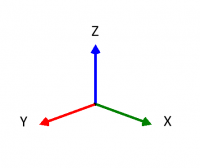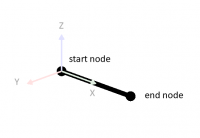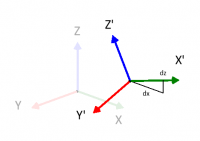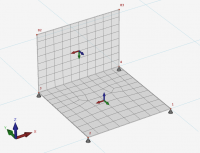Struct4U Design Arrangements: Difference between revisions
Created page with "asa" |
Rob-Struct4u (talk | contribs) No edit summary Tag: visualeditor |
||
| (One intermediate revision by one other user not shown) | |||
| Line 1: | Line 1: | ||
[http://68.183.11.126/index.php/Documentation_XFEM4U BACK] | |||
The coordinate systems and design arrangement are identical for all the programs of the Struct4U Engineering Tools. We know four '''clockwise''' coordinate systems. | |||
====Main coordinate system==== | |||
The location of this global coordinate system is arbitrary. The XY-plane coincides with the plane of the framework. This coordinate system is used for setting the node coordinates, node limitations and node loads. Calculated node deformations and support reactions will be displayed relative to this coordinate system. | |||
Within [[XFrame2D]] and [[XBeam2D]] the 2D-elevation of the frame is in the XZ-plane.[[File:MainCoordinates.png|200px|none|link=http://68.183.11.126/index.php/File:MainCoordinates.png]] | |||
====Beam coordinate system==== | |||
The origin of this coordinate system is always in the beginning of the relevant beam. The XZ-plane coincides with the plane of the framework. The x-axis coincides with the beam-axis.[[File:BeamCoordinates.png|200px|none|link=http://68.183.11.126/index.php/File:BeamCoordinates.png]] | |||
====Node coordinate system==== | |||
[[File:NodeCoordinate.png|200px|none|link=http://68.183.11.126/index.php/File:NodeCoordinate.png]]It is possible to use a local (node-) coordinate system. The origin lies in the relevant node. The direction of the x-axis is determined by assigning a relative dx and dz coming from the relevant node ( see the figure above). Local coordinate systems can be used to calculate node limitations ( support reactions and restrains ), node loads and/or node deformations in an arbitrary direction. | |||
====Plate coordinate system==== | |||
The planar plane of the plate is the local XY-plane. If the plate is drawn clockwise then the Z-axe is positive.[[File:PlateCoordinateSystem.png|200px|none|link=http://68.183.11.126/index.php/File:PlateCoordinateSystem.png]]The in- and output data will be displayed with regard to the above explained coordinate system. | |||
*A force in the direction of the positive x- or z- axis is considered positive. | |||
*A moment rotating from the positive x-axis to the positive z-axis (according to the cork-screw rule) is positive. | |||
*A moment opposite to the 'clockwise' rotation is positive. | |||
Latest revision as of 14:18, 26 October 2022
The coordinate systems and design arrangement are identical for all the programs of the Struct4U Engineering Tools. We know four clockwise coordinate systems.
Main coordinate system
The location of this global coordinate system is arbitrary. The XY-plane coincides with the plane of the framework. This coordinate system is used for setting the node coordinates, node limitations and node loads. Calculated node deformations and support reactions will be displayed relative to this coordinate system.
Within XFrame2D and XBeam2D the 2D-elevation of the frame is in the XZ-plane.

Beam coordinate system
The origin of this coordinate system is always in the beginning of the relevant beam. The XZ-plane coincides with the plane of the framework. The x-axis coincides with the beam-axis.

Node coordinate system

It is possible to use a local (node-) coordinate system. The origin lies in the relevant node. The direction of the x-axis is determined by assigning a relative dx and dz coming from the relevant node ( see the figure above). Local coordinate systems can be used to calculate node limitations ( support reactions and restrains ), node loads and/or node deformations in an arbitrary direction.
Plate coordinate system
The planar plane of the plate is the local XY-plane. If the plate is drawn clockwise then the Z-axe is positive.

The in- and output data will be displayed with regard to the above explained coordinate system.
- A force in the direction of the positive x- or z- axis is considered positive.
- A moment rotating from the positive x-axis to the positive z-axis (according to the cork-screw rule) is positive.
- A moment opposite to the 'clockwise' rotation is positive.